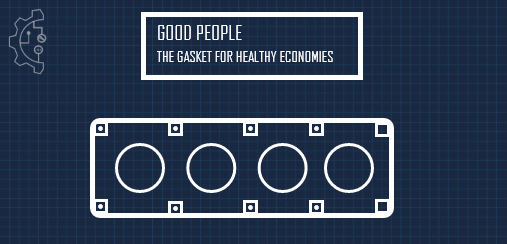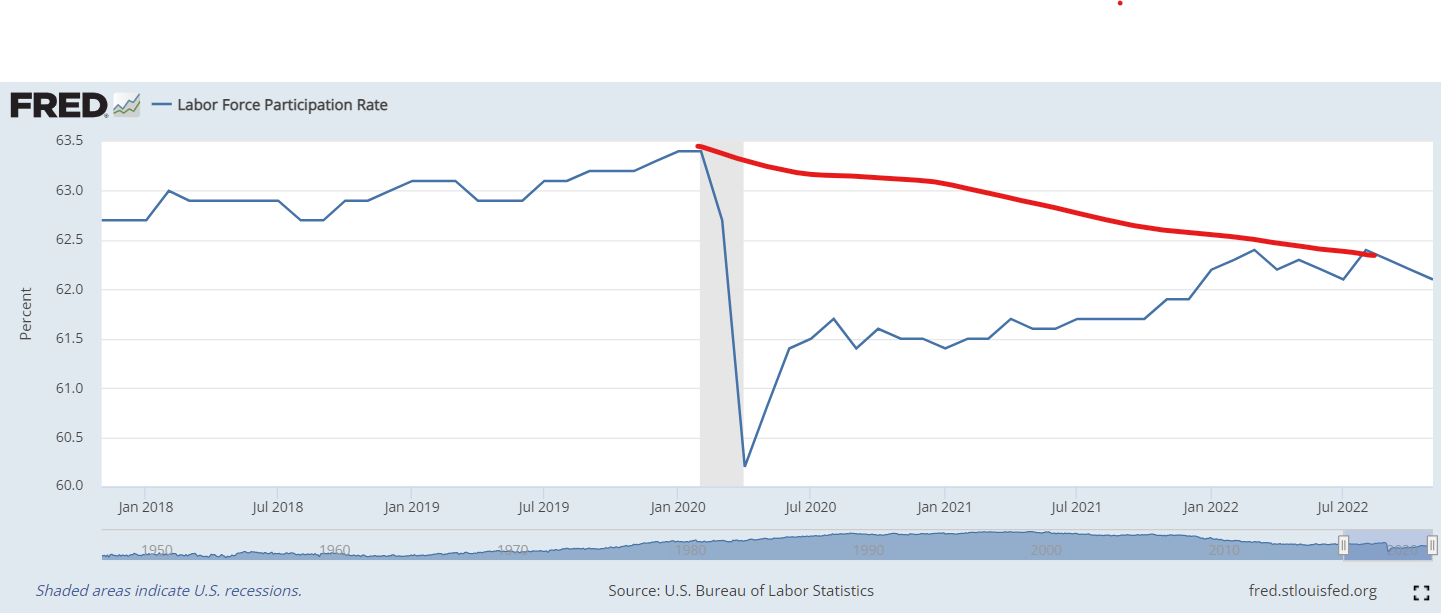
Mecfi’s Sentiment
Markets: Similar to last week, I’m bullish until year-end, but after I encourage investors to be more productive in making contributions. Likey, Q1 will see a downturn caused by past rate hikes. The impacts of the changes are now on their way to the market.
Economics: Unfortunately, like every news station reports, the more bad news we see about the economy is good. People want lower prices. However, getting there requires increasing unemployment and lowering consumption. Both mean real families out of work. However, in this case, because of the economy's capacity, real people are out of their homes too. That's true in the sense that per person working, they are supporting fewer people than before. I don't have this figure, but when it goes down, it’s like gain green, a form of deterioration that can’t be undone. Here is the employment participation rate; it went down a lot. The concern is if it never recovers.

Real Mechanics
Positive Currents:
- Sticking with the theme of transparency, the municipal bond markets appear to be moving in the right direction. Balance sheets, income, and cash flow statements are great places to discuss adding more transparency. Wall Street Journals, Heather Gillers, wrote a piece on legislation aimed at congress pressuring public and quasi-public institutions on how they report financials. Legislators want to make them machine-readable.
- City leaders are on the other side of this …
- Their primary argument has been that the cost outweighs the benefits, and the new standards of transparency could potentially drive away investors. This seems impossible to me. Even if it did, there is a likely chance they shouldn't have been investors. And for me, when it comes down to it, either you're a manager who can be profitable or not. And if a funding gap was formed, that would be the opportunity to distill out impurities in the foundation of the investor base and poor city managers. I see that seems harsh but forward is still better.
- Now, don’t think it’s all bad. 80% of those entities currently follow a standard put forth by (entity name), leaving only 20% not participating. This is a good start compared to zero or even 50%.
- Social media is necessary to talk about, considering all the noise we are currently hearing about with Elon Musk’s recent acquisition of Twitter and Facebook’s (they will always be Facebook in my mind) failed earnings. However, a positive thing to highlight is that apparently, Facebook has been working on ways to reduce toxic content on its platform ... and they’ve been successful.
- Facebook formed a community to help discover creative ways to reduce the content without impacting genuine individuals using the platform. A recent report said after forming this committee realized the type of content that often dominated the highest attention time was spammy, oversexualized, or found regrettable. And this content repeatedly made the top of the list. However, after implementing changes in their algo, they reduce the amount of the top 20 posts containing that content by nearly 100% (see success).
- However, if you're paying attention, we are talking about the top "20 posts".
- There are thousands of posts per day.
- They are focused on the top 50, 100, and 500 now.
- … they started.
References:
Wall Street Journal - Local Governments, Many on Wall Street Line Up Against Muni-Data Bill - Heather Gillers - Nov 26, 2022
Facebook’s Most Popular Posts Were Trash. Here is How it Cleaned Up - Jeff Horwitz - Nov. 22, 2022
Negative Currents:
- Instead of highlighting any specific article for this point, I will just give a small take on the FTX Scandal. At this point, although there has been a ton of information relating to the issue already released, I’m afraid we could only at the beginning of it. This will be a high-level story where the people involved will sit in important seats. However, this newsletter will not follow that track, so I digress from that lens.
- Instead, I want to focus on another aspect relating to transparency. In my view, the single most important component of finance is usually the first section of every technical finance book - ethics. There is no substitution for it. And there should be no device to provide an excuse to use less of it. And there is no environment that can thrive in the long term without it.
- Despite the success and riches, some people receive from their new innovations and bad behavior, good people still make the world work and move forward. This is not even complicated to understand. Sure they are not typically highlighted, but they are the ones. Trust that idea.
- We need to stop trying to replace that gear, it’s still a component that makes the machine turn smoother.
- And to really rap this up, here is advice to Sam and future Sams:
“Stop, dumb***.”
- Mark Dyer, Managing Member, COO
References:
Mark Dyer - Managing Member, COO for Mechanical Financial, LLC, located in Sacramento, CA, and owner of this newsletter
Firm Updates:
- MechFi opened it’s first account
- It’s tax season soon, and Mechfi will be taking appointments soon to prepare taxes.
This Weeks Reads/Beats:
- Chapter one of Liars Poker by Michael Lewis.
- Chapter one of Diaries of a Hedge Fund Manager